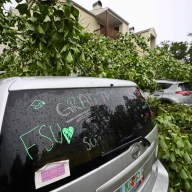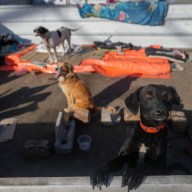Gathering the family around a candlelit table can sound quite cozy — until it gets scary. For many parents on the East Coast this week, the normal stress of parenting has been affected by loss of power, evacuation and a widespread devastation in some areas. During extreme weather like Hurricane Sandy, parents are burdened with trying to find information about loved ones and, in many cases, assessing the damage. At the very least, kids out of school get cooped up and bored.
Dr. Dawn Huebner, a child psychologist and author of a “what-to-do” series of guides for children, says that the most important thing for parents to remember during an emergency situation is to keep separate what they are experiencing from their children.
“Parents are going to be seeking out information and wanting to watch the news or listen to reports or looking at the devastated sites. All of that is terrifying to children.”
Huebner says parents should try and be as calm and reassuring to their children as possible. Even for families who have been evacuated, Huebner says parents can try to reassure children that the family is safe. If the situation is dire, focusing on how the family will get through the challenging part is a good technique.
Sometimes, extreme weather can give a family a chance to shine together. For Erin Zammett Ruddy, a blogger for Parenting.com and mother of two kids ages 2 and 5, keeping the children occupied is key. Ruddy’s family lost power during Hurricane Sandy for days — she was one of the 450,000 Long Island residents without power — but she is grateful to be able to make her home a de facto clubhouse for her friends and relatives. Ruddy is a big believer in keeping the family’s routine going as much as possible, a trait Dr. Huebner recommends.
“We made sure they have still been having their eating and sleeping and napping routines,” Ruddy says.
By now, most schools in the region affected by Hurricane Sandy will have returned to classes. Lara Pasternak, a drama teacher at I.S. 61 in Corona, Queens, sees the hurricane as a way for students to empower themselves and give back to communities. “I work in an area that’s economically depressed, but no matter how little the students have, they are very generous,” Pasternak says, adding that donating and volunteering is an essential lesson in humanity and civic duty.
Top techniques
Tips for parenting during extreme weather from Dr. Dawn Huebner, child psychologist and author:
Use “feelings words” when talking to children.
Acknowledge that something is scary or sad, addressing uncertainty.
Give reassurance that the family is safe, if that is true.
If disaster is striking, parents can assure children that they will take care of them and that police and city agencies are working hard.
Maintain routines.
Children can be especially clingy or show regressive behavior during extreme weather. Routines should be maintained as much as possible.
















